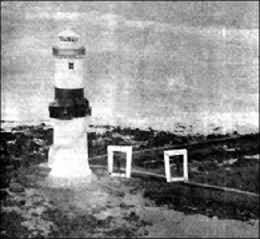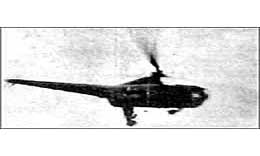|
Fifty years ago a dramatic rescue of three men who were marooned for several days on the Black Rock Lighthouse in
In the teeth of a howling gale with lashing rain, the thrilling rescue of three men, marooned on the Black Rock Lighthouse, in
Two of the men were from
The two Dublin men, technicians employed by the Commissioners of Irish Lights, were 38 years old, Dick Delaney, married and the father of five children, of 173 Rafter’s Road, Crumlin and 55 years old James Lambert, unmarried, of 1 Donacarney Road. The local man was
When the men left
A relief boat with further food supplies was due to arrive at the lighthouse on Saturday last, but due to the adverse weather conditions which were prevailing, it was unable to make the crossing.
On Sunday, early in the afternoon, a motor boat with Messrs, Austin Gillen and Joseph Haran, Rosses Point on board, who were accompanied by Principal Lightkeeper Duggan from Oyster Island, attempted to make the crossing to the lighthouse, but due to the heavy seas that were running, were unsuccessful in their effort.
After the relief boat failed to arrive on Saturday, and seeing that the gale which was blowing showed every indication of continuing, the stranded men held a conference on their lonely outpost and decided that a food rationing system must be implemented immediately in order to conserve their supplies.
Next move was to raise a flag on the lighthouse as a distress signal and when this was seen on the mainland, word of the situation was sent to the Commissioners of Irish Lights at their head office at
On Wednesday night a representative of the Commissioners,
On yesterday morning, when the gale had not yet subsided and it was found to be impossible to use the rescue gear,
Shortly after mid-day,
As they flew over the lighthouse, they could see two of the men standing on the balcony waving their arms and as they came in closer they could see the men pointing towards their mouths with their hands.
Returning to
Back at the landing ground once again,
On enquiry, however, it was ascertained that the food parcels would be ready soon after
Meanwhile, unknown to the mercy men at
This was confirmed by our staff reporter, who received a telephone call at
Shortly before
Making separate runs, the helicopter took off the men and landed them on
Soon after they were conveyed to the mainland, where they gave a graphic description of their experience.
Sitting before a roaring fire and faced with plates of rashers and eggs in the residence of
This small grey haired man, who had been fifteen years in the Irish Lighthouse service and who, with his father, served together in the Irish Army, said that in all his years experience of tending lighthouses, he never experienced a gale as blew itself around the Black Rock this week.
BOAT
“On Sunday afternoon,” he said, “we watched as a boat came down the channel and out the bay. We watched it as it neared the Wheat Rock Buoy, and then after it turned to attempt the crossing to the lighthouse. I saw it stand up almost on its stern end. I knew then that it could never make as far as us, and no surprise when it turned back towards
“We had a conference on Saturday night and decided to ration our food supplies. When rescue arrived, we were running perilously low of fresh water- we had taken three kegs with us-paraffin oil for our cooking stove and provisions.
“My companions picked periwinkles off the rocks and we cooked them and ate them. I did not care for them very much - I only had two or three spoonfuls and it was a good job that I brought some stomach powder with me as I believe I would have died after eating them.
“We searched the rocks during low water during daylight hours for crabs and lobsters, but could fined none. On Wednesday our main meal consisted of a tin of peas and one onion divided between the three of us.
“Today, at lunch time, we boiled pieces of cabbage, turnip and carrot and ate them. We had no meat, tea or potatoes,” went on
Their only source of heat was from their oil cooking stove, but this they could light only at periods as they were forced to conserve their paraffin oil supply.
“I used to go to bed early at night as I found it was the warmest place to be. We had a Dunlopillo mattress with us and plenty of blankets, so as far as bedding was concerned we were all right.”
Mr. Lambert went on to say that his work on the lighthouse, which was connected with the light flashing apparatus, was completed on Sunday and from then on he found that time hung heavily on his hands while they were awaiting rescue.
“I read and re-read the few newspapers and magazines we had brought with us to the lighthouse and then we just sat around and told stories.”
However, he said, when the weather calms he will return to the lighthouse and complete his repair work but will travel between
Both
“It was heart breaking not to have smoke” said
MAINLAND
Referring to the flights of
“When I saw the aeroplane,” said
Asked about their short flight from the lighthouse to
Although neither of them had ever flown before, they had no fears and
Interviewed by our representative near the shore in
“Last night was a particularly worrying time.” She said, adding: “It is all over safely now, thank God.”
The helicopter, which made the sixty-mile journey from Eglington, was piloted by
Last night it was learned that this was the first occasion on which men have been successfully rescued by helicopter from an Irish lighthouse.


